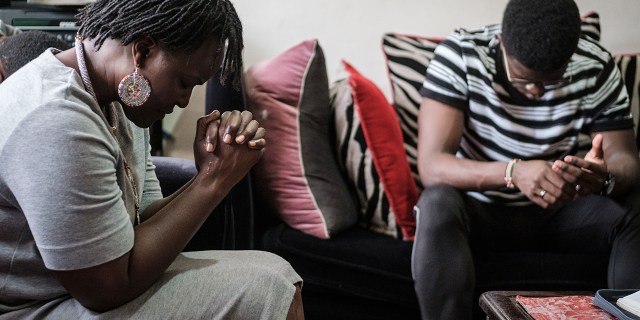
How we did this
This report explores cross-national perceptions of religion, including the connection between belief in God and morality, the role God and prayer play in people’s lives and the importance of religion. It also includes trend analyses about the evolution of the importance of God in Europe since the dissolution of the Soviet Union.
For this report, we used data from a survey conducted across 34 countries from May 13 to Oct. 2, 2019, totaling 38,426 respondents. The surveys were conducted face-to-face across Africa, Latin America and the Middle East, and on the phone in United States and Canada. In the Asia-Pacific region, face-to-face surveys were conducted in India, Indonesia and the Philippines, while phone surveys were administered in Australia, Japan and South Korea. Across Europe, the survey was conducted over the phone in France, Germany, the Netherlands, Spain, Sweden and the UK, but face-to-face in Bulgaria, the Czech Republic, Greece, Hungary, Italy, Lithuania, Poland, Russia, Slovakia and Ukraine.
Here are the questions used for the report, along with responses, and the survey methodology.
What is the connection between belief in God and morality? And how important are God and prayer in people’s lives? Pew Research Center posed these questions to 38,426 people in 34 countries in 2019.
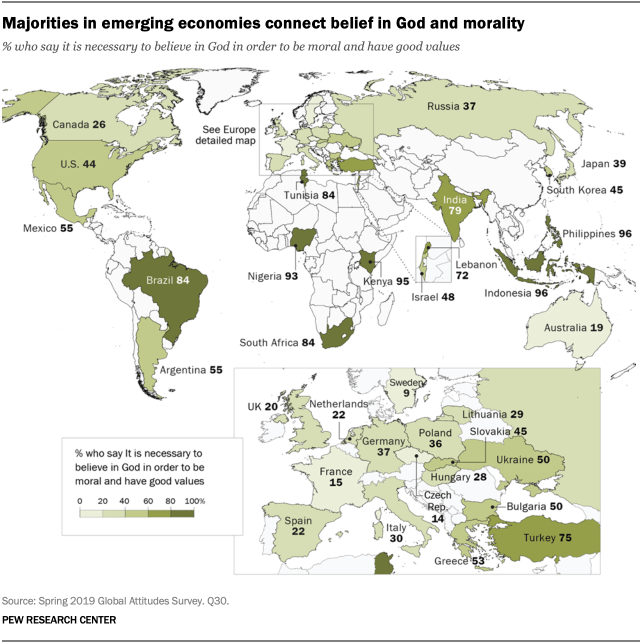
Across the 34 countries, which span six continents, a median of 45% say it is necessary to believe in God to be moral and have good values. But there are large regional variations in answers to this question.
People in the emerging economies included in this survey tend to be more religious and more likely to consider religion to be important in their lives, and they are also more likely than people in this survey who live in advanced economies to say that belief in God is necessary to be moral. Differences occur within countries as well. In general, people who are relatively nonreligious are more inclined than highly religious people in the same countries to say it is not necessary to believe in God to be a moral person.
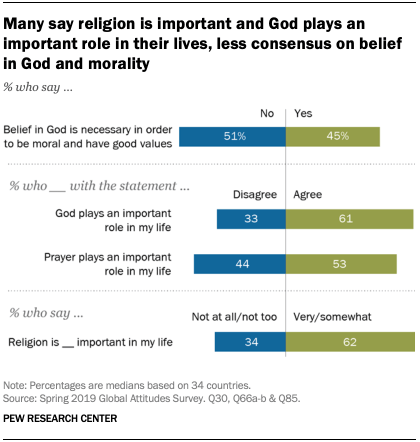
Despite variances in religious observance, a median of 62% across the countries surveyed say that religion plays an important role in their lives, while 61% agree that God plays an important role in their lives and 53% say the same about prayer. Since 1991, the share of people who say God is important to them has increased in Russia and Ukraine, while the opposite has occurred over the same time span in Western Europe.
In the eight Western European publics surveyed, a median of just 22% say belief in God is necessary to be moral, while in the six Eastern European nations studied, a median of 33% share the same view. Prior research establishes the European continent as increasingly secular on the whole, though among Europeans, there are notable differences between Eastern and Western countries in attitudes toward religion and religious minorities.
Opinions on whether belief in God is necessary to have good values vary by region
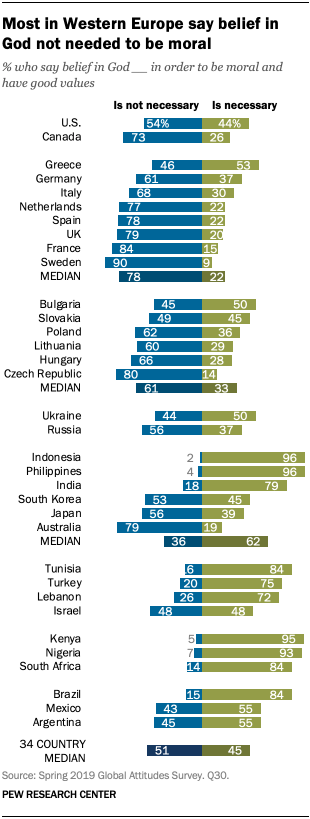
Of all 13 countries surveyed in the European Union, Greece has the largest share of residents who tie belief in God to morality (53%), followed closely by Bulgaria (50%) and Slovakia (45%). Still, in many countries on the European continent, relatively few people say it is necessary to believe in God to be moral, including just 9% in Sweden, 14% in the Czech Republic and 15% in France.
Less than half in both Canada and the U.S. say belief in God is necessary to be moral (26% and 44%, respectively). (For more on religion in the U.S., go to “In a Politically Polarized Era, Sharp Divides in Both Partisan Coalitions.”)
By contrast, nearly everyone surveyed in Indonesia and the Philippines (96% each) draws a connection between belief in God and having good values. And nearly eight-in-ten (79%) in India say the same. But in East Asia, South Koreans are somewhat split on this question (53% say it is necessary, 46% say it is not), while smaller shares in Japan (39%) and Australia (19%) take the view that it’s necessary to believe in God to be a moral person.
Among those in the Middle East and North African nations surveyed, at least seven-in-ten in Lebanon (72%), Turkey (75%) and Tunisia (84%) think belief in God is necessary to have good values. Israelis are split on this question, with 48% of the population on either side.
Additionally, strong majorities in each of the sub-Saharan African nations surveyed say belief in God is necessary to be moral. Over nine-in-ten in Kenya and Nigeria (95% and 93%, respectively) connect belief in God with morality, while 84% of South Africans are of the same opinion.
Majorities in all three Latin American countries surveyed say that belief in God is necessary to be moral, with the highest share in Brazil (84%). Catholicism remains the largest religion in Latin America, and majorities of Catholics in all three nations surveyed think it is necessary to believe in God to be moral.
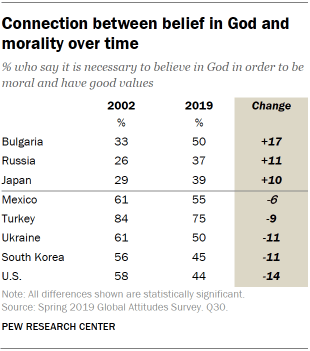
Strikingly, both Russia and Ukraine have seen an evolution of opinion on this question, but in opposite directions. Russia has seen an 11 percentage point increase since 2002 in the share who say belief in God is necessary to have good values, while Ukraine has seen an 11-point drop. Aside from Russia, only two other countries – Bulgaria and Japan – have seen significant increases in the share of their publics who hold this opinion (17 points and 10 points, respectively). In addition to Ukraine, four other countries – Mexico, Turkey, South Korea and the United States – have seen significant decreases in the percentage of their publics who say belief in God is necessary to be moral.
Differences in views on belief in God and morality by GDP per capita
Overall, respondents in nations with lower gross domestic product are more likely to say that belief in God is necessary to be moral and have good values. In other words, there is an inverse relationship between GDP per capita and the percentage of the public that draws this connection between belief in God and morality. Statistical analysis shows a strong inverse correlation, with a coefficient of -0.86.
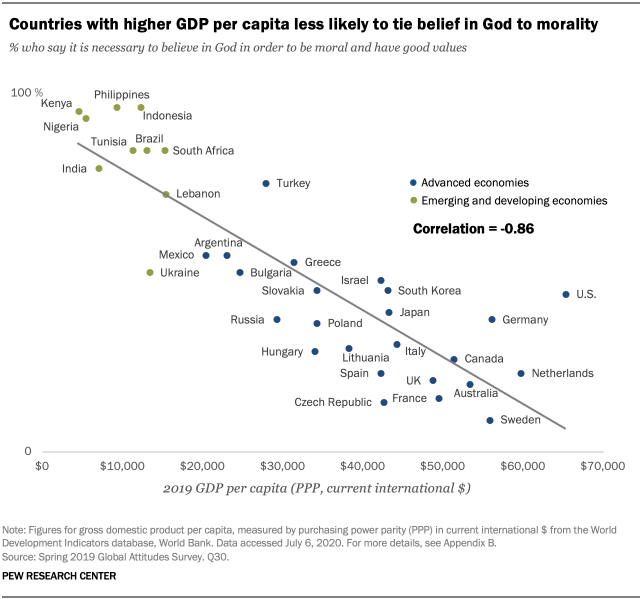
For example, in Kenya, which has the lowest GDP per capita of all 34 nations included in this analysis ($4,509 in 2019) 95% of respondents express the view that belief in God is integral to being moral.
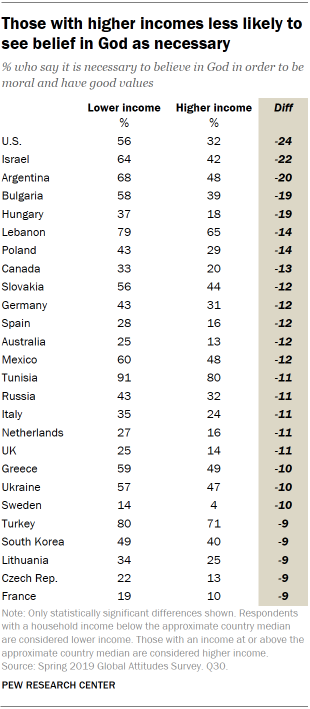
By contrast, only 9% of respondents in Sweden – which has one of the highest GDP per capita of the nations surveyed ($55,815 in 2019) – say belief in God is necessary to be moral. This pattern is consistent with prior research that has found that Europeans tend to be less religious than people in many other parts of the world.
On an individual basis, those who earn at or above the median income threshold in most nations are significantly less likely to say that belief in God is necessary for morality. The largest difference between those at different income levels is in the U.S., where there is a 24 percentage point difference between those below the median income and those at or above it.
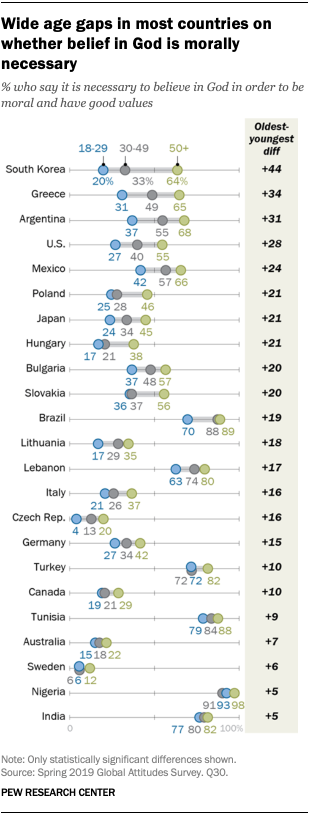
Most countries surveyed display generational gaps on the question of whether belief in God is necessary in order to be moral and have good values. In keeping with past analyses that found younger adults are generally less religious by several measures, 18- to 29-year-olds are the least likely to say it is necessary to believe in God to be moral. In a majority of the 34 countries surveyed, those ages 50 and older are significantly more likely than those ages 18 to 29 to think that belief in God is necessary for morality.
This is especially true in South Korea, where 64% of older adults take the position that belief in God is connected with morality, while only one-fifth of younger South Koreans say the same. The gap between adults ages 50 and older and adults ages 18 to 29 is equal to or greater than 20 percentage points in South Korea, Greece, Argentina, the U.S., Mexico, Poland, Japan, Hungary, Bulgaria and Slovakia.
Age gaps on this question are present in nearly every region of the world. In Nigeria, Tunisia, Turkey and Brazil, at least seven-in-ten people in every age group agree that belief in God is necessary to morality. However, in the Czech Republic and Sweden, no more than two-in-ten people in every age group take that position. In no country surveyed were 18- to 29-year-olds more likely than older age cohorts to say that it is necessary to believe in God to be moral.
More education connected with belief that God is not necessary to have good values
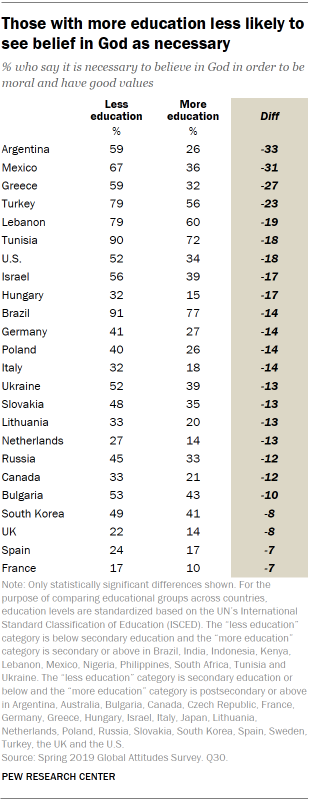
In most European and North American countries surveyed, individuals with more education are less likely to say that belief in God is necessary to be moral. This pattern closely tracks the connection between income levels and the way people answer this question, because there is a significant correlation between educational attainment and earnings.
In addition, there are differences on this question among respondents at different education levels in several other nations included in the 2019 survey. In 24 out of the 34 countries surveyed, respondents with higher levels of education are significantly less likely to say belief in God is necessary to be moral. There are no significant differences among the other 10 countries included in the survey.
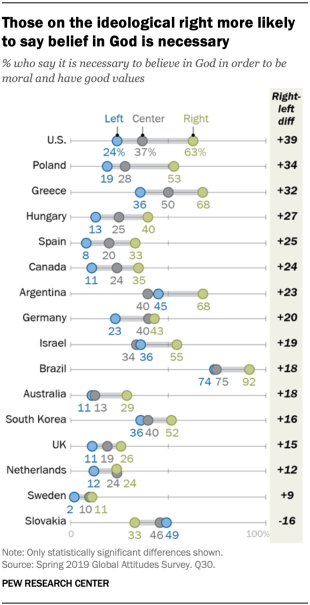
In 15 countries surveyed, those on the ideological right are significantly more likely to say it is necessary to believe in God in order to be moral and have good values (ideology is self-reported and varies by country). Majorities of those on the right in the U.S., Greece, Argentina and Israel say that belief in God is necessary for morality; less than half of those on the left in those countries say the same. The left-right gap exceeds 30 percentage points in the U.S., Poland and Greece.
Though only about one-in-ten right-leaning Swedes say that it is morally necessary to believe in God, the right-left gap persists even in Sweden: Just 2% of those on the left say the same. Those on the right also are significantly more likely to say it is necessary to believe in God in order to be moral in Hungary, Spain, Canada, Argentina, Germany, Israel, Brazil, Australia, South Korea, the UK, the Netherlands and Sweden.
Slovakia is the only country surveyed where those on the left are more likely to say that it is necessary to believe in God in order to be moral: 49% of those on the left in Slovakia agree, compared with 33% of those on the right.
The importance of religion varies around the globe
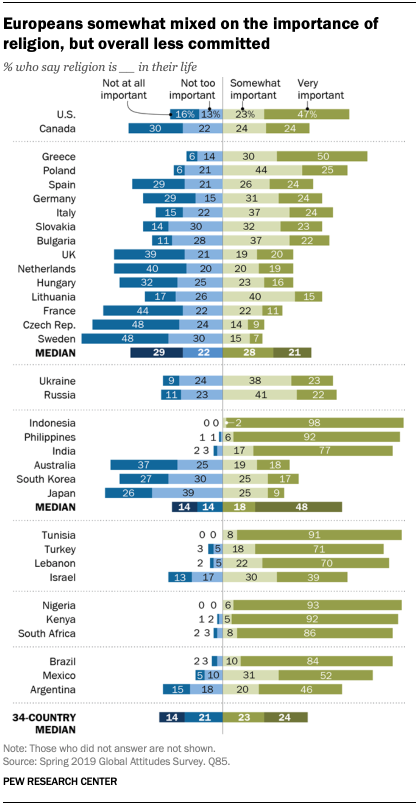
In most of the countries surveyed, more than half of the public says religion is either “very important” or “somewhat important” in their lives. However, Europeans generally show less religious commitment on this measure than people in other regions.
When asked about the importance of religion in their lives, majorities in 23 out of 34 countries say religion is very or somewhat important to them. This includes nine-in-ten or more in Indonesia, Nigeria, Tunisia, the Philippines, Kenya, India, South Africa, Brazil and Lebanon.
Majorities in several of these countries have particularly high levels of religious commitment, saying religion is very important their lives. Such attitudes are common in Indonesia (98%), the Philippines (92%), Tunisia (91%), Brazil (84%), India (77%), Turkey (71%), Lebanon (70%) and all African countries surveyed – 93% in Nigeria, 92% in Kenya and 86% in South Africa.
Meanwhile, the European countries in the study tend to have much smaller shares who say religion is either very or somewhat important in their lives, including 22% of adults in Sweden, 23% in the Czech Republic, 33% in France and 39% in both the Netherlands and Hungary.
In multiple European nations, pluralities say religion is “not at all” important in their lives. This is the case in the Czech Republic, France, the Netherlands, Sweden and the United Kingdom, where adults are more likely to say religion is not at all important in their lives than to choose any other answer option.
On the other hand, more than six-in-ten respondents in Greece, Poland and Italy say religion is very or somewhat important in their lives. More people in Greece say religion is at least somewhat important to them (80%) than in any other European country. Lesser majorities in Germany, Slovakia, Lithuania (each at 55%) and Bulgaria (59%) say religion is at least somewhat important to them.
More say God plays an important role in life than say the same about prayer
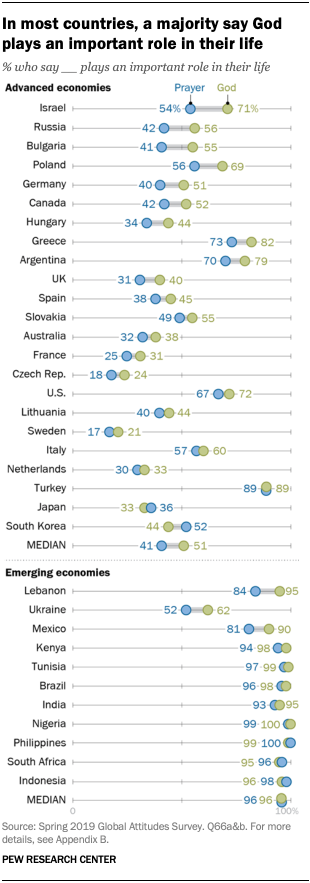
When asked separate questions about the roles that prayer and God play in their lives, more respondents say that God is important than say that prayer is important, though strong majorities in half of the countries surveyed say that both are important to them. Across 34 countries, a median of 61% say that God plays an important role in their lives, compared with 53% who say that prayer is important in their daily life.
Just as respondents in wealthier countries tend to disagree that it is necessary to believe in God to be a moral person, people in wealthier countries generally say that God and prayer are not especially important in their lives (For more on advanced and emerging economies, see Appendix B). People in emerging economies are more than twice as likely as people in advanced economies to agree that prayer is an important part of daily life. Nine-in-ten or more respondents in all the emerging economies surveyed (except for Ukraine) say that God plays an important role in their lives. By contrast, less than half of respondents in 11 of the economically advanced countries surveyed consider God to be important in life. Similarly, while a median of 41% across these advanced economies say that prayer is an important part of daily life, 96% of those in emerging economies say that it is.
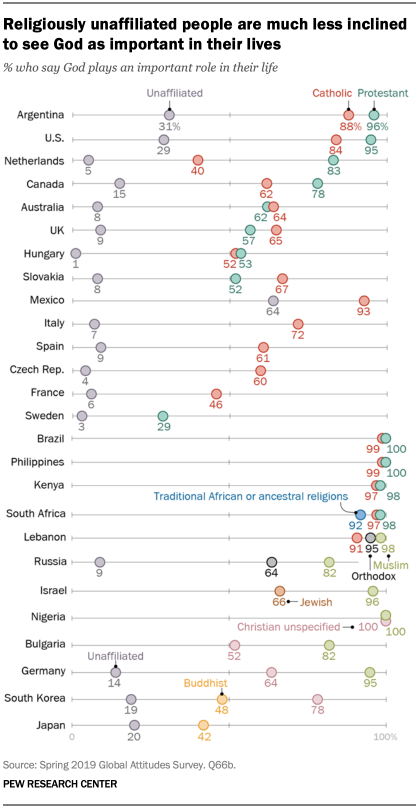
In some countries, respondents are less likely to say that prayer is an important part of daily life than they are to say that God is important in their lives. For example, 71% of Israeli respondents say that God is important in their life, while 54% say the same about prayer. Muslim Israelis drive much of this sentiment. Among Muslim Israelis, 96% say God is important in their life, compared with 66% of Jewish Israelis; 81% of Muslim Israelis say prayer is important, compared with 50% of Jewish Israelis.
Views on whether God plays an important role in life differ substantially based on religious affiliation as well. Not surprisingly, in most countries relatively few religiously unaffiliated people (those who say they are atheist, agnostic or “nothing in particular”) agree that God is important in their lives. Still, around three-in-ten religiously unaffiliated people in Argentina and the U.S. say that God is important to them, and a majority of religiously unaffiliated people in Mexico say that God plays an important role in their lives.
There is near unanimous agreement that God is important in life among people of all major religious affiliations in Brazil, the Philippines and Kenya, as well as among all Muslim and Christian respondents in Nigeria.
The rising significance of God after the dissolution of the Soviet Union
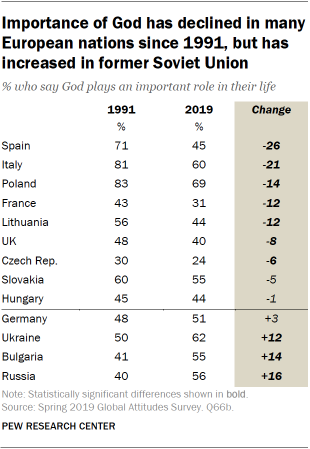
Following well-documented trends that trace the decline of Christianity in Western Europe, the share of Europeans who say that God plays an important role in life has declined since 1991. Spain, Italy and Poland had the most dramatic decreases, with declines of 26, 21 and 14 percentage points, respectively. This trend is mirrored in many other European countries, including Lithuania. Since the collapse of the USSR, Lithuania has seen a 12 percentage point drop in the share of its public that feels God plays an important role in their lives.
At the same time, other former Soviet republics where religion was harshly repressed or effectively banned during the Soviet period have experienced an increase in the percentage of people who say God plays an important role in life. Both Ukraine and Russia have experienced double-digit increases in the share of people who agree that God is important to them. In Bulgaria, a former satellite state of the USSR, 41% said in 1991 that God was important in their lives. Today, a majority of Bulgarian respondents (55%) express that view.
Similar trends hold for those who say prayer is an important part of their daily lives.